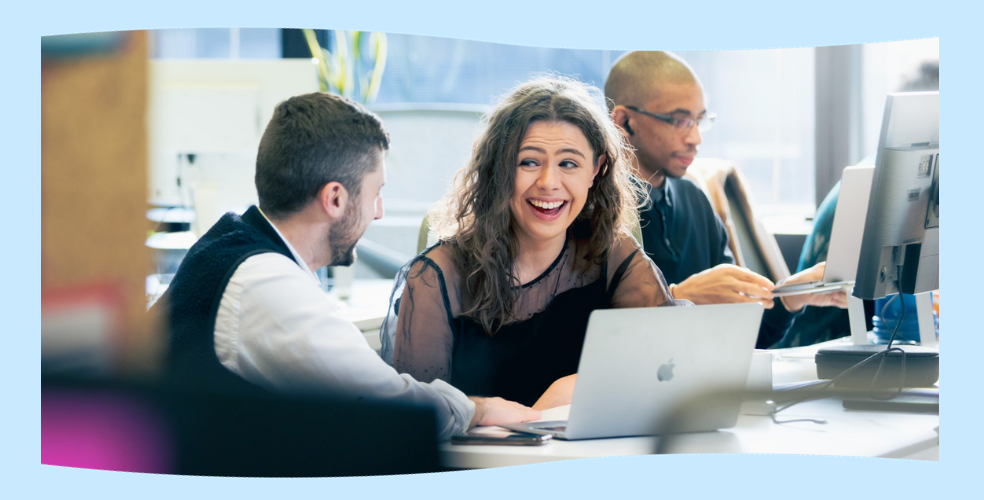In our content design team, we all have a ‘manual of me’. Among our strengths and the types of work we enjoy, we write down the things we might need help with, and the type of work we might struggle with. Manuals like this are common in teams and a great way to learn more about our peers, their strengths and weaknesses.
It’s been reassuring to see there are people who struggle with similar things I do. It’s even more reassuring to see this from people who are of higher seniority than me. It shows that we’ve all got things we find tricky, no matter how much experience we have.
For example, Tim, another content designer in my team, recently wrote about his first time working on an alpha and his experience working in this environment when he didn’t yet fully understand what this meant. I’m glad his blog post exists to show that there’ll always be things we don’t understand. That’s totally normal and nobody expects us to know it all. We’re all human.
From marketing to content design
It’s been three years since I started my career as a content designer. I came from a marketing background and a job that was about to make me redundant. I’m not sure I completely grasped the concept of content design at first, and the odd transition to my new role meant I definitely needed to grow my confidence.
Three years later and I can see the growth between then and now. I don’t claim to have conquered all my fears, but I’m making progress and I’m putting the effort in. I want to share some things that have helped me over the past few years, while giving some real examples of the things I find hard and how I try to overcome them. They won’t work for everyone, but that’s ok. Hopefully this blog post can help everyone think about strategies to improve their own confidence.
Find the methods that work for you
I used to be a sucker for a script. Whenever I’d have to present anything in front of people, I’d write out every word I planned on saying out loud. Not just high level bullet points, but an actual script, because knowing exactly what I was going to say helped me feel more comfortable. These days, I’m less reliant on fully fledged scripts, but I still make sure I’m prepared with some bullet points of what I want to cover.
I used to feel embarrassed about this, but it doesn’t matter that this used to be my method of choice. Nobody would have cared if they knew, and I’d bet that a lot of us have our own ways of dealing with the things we’re less confident at doing. We just don’t always talk about them.
Figure out what things you can do to help you feel prepared in similar situations and embrace the process of trial and error.
Ask for support from people you trust
Opening up can feel vulnerable to some people. It can sometimes feel like you’re admitting to something you’re embarrassed about, but I personally find it helps me to be open and honest rather than to sit in silence with my own thoughts.
A recent example of this is when I needed to deliver a workshop. I wanted to do it. In fact, I volunteered to do it, but it’s not something I had a huge amount of experience with at the time.
I opened up to a colleague on my project about how I was feeling. He volunteered to join the workshop, but as an observer, with his camera and microphone both switched off. Knowing he was there in the background to jump in if I needed him was really reassuring. He also sent me messages in the background during the workshop, things like “don’t be afraid to move on if they’re not voting”. These little prompts helped guide me through it, and the people in the workshop were none the wiser.
It sounds obvious, but the people around you generally don't want to see you fail. In fact, they often want to see you succeed, and providing help when you ask for it is a way to help you succeed. Often you’ll discover that your colleagues find it rewarding too.
Take small steps
Taking smaller risks first allows you to gain confidence over a period of time in the build up to the bigger challenge you want to tackle.
Last year, a colleague from a previous job asked if I wanted to deliver a talk at an external event alongside her. I knew I wanted to, but I was a long way from public speaking at this point. So in the build up to it, I looked for opportunities which allowed me to practise. I started presenting more often at the client show and tells which came around every two weeks. This was a good way to flex my public speaking skills in a more contained environment with a lot less people!
Identify your confidence gremlin
A colleague introduced me to the concept of Confidence Gremlins a couple of years ago. It comes from the book ‘How to overcome your Confidence Gremlins’ by Sarah Ellis and Helen Tupper. How to overcome your Confidence Gremlins is available as a free PDF.
At the end of the book is a template for:
-
identifying your confidence gremlin
-
explaining how it holds you back
-
giving yourself three small actions that will help you test your confidence gremlin
-
giving yourself a reward when the actions are met
I love this way of playfully exposing your fears. Recognising, owning and taming them is a helpful way to start to overcome them.
Just keep going
I was reading Julie Smith’s book 'Why has nobody told me this before?’ recently, and loved this quote:
“Every time we step into the unknown and try something new, experience that vulnerability, make mistakes, get through them and build some confidence, we move on to the next chapter with evidence that we can get through tough challenges.”
Confidence isn't something you just wake up with one day – it's something you have to work on continually throughout your career. What's difficult for you may come naturally to someone else, and vice versa.
Tough challenges can look different to everyone, but it's important to remember we're all doing our best – and your tough challenges are just as important as everyone else's.
Our recent design blog posts
Transformation is for everyone. We love sharing our thoughts, approaches, learning and research all gained from the work we do.
-

-

Naming services in complex situations
Read blog post -

Using inclusive research approaches with Blood Cancer UK
Read blog post -

Designing for users who don’t exist (yet)
Read blog post

